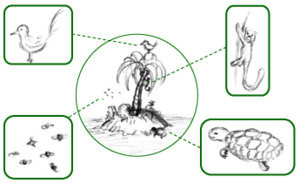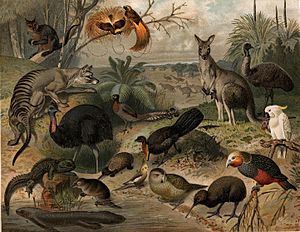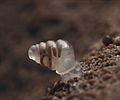Fauna facts for kids
Fauna is a word that means all the animal life in a specific place or during a certain time. Think of it as a group name for all the animals.
For example, the fauna of the Eocene period (a long time ago) was very different from the fauna of today. You can also talk about the fauna of a particular habitat, like a savannah or a rain forest. The animals you find in a savannah are different from those in a rain forest. This word is similar to "flora," which means all the plant life.
Contents
- Types of Fauna
- Cryofauna: Animals of the Ice
- Cryptofauna: Hidden Animals
- Infauna: Animals Living in the Bottom
- Epifauna: Animals Living on the Bottom
- Macrofauna: The Bigger Bottom Dwellers
- Megafauna: Really Big Animals
- Meiofauna: Tiny Water Animals
- Mesofauna: Soil Dwellers
- Microfauna: Super Tiny Animals
- Other Types of Fauna
- Images for kids
- See also
Types of Fauna
Scientists use different terms to describe groups of animals based on where they live or how big they are. Here are some of them:
Cryofauna: Animals of the Ice
Cryofauna are animals that live in or very close to ice. This includes creatures found in icy regions like the Arctic or Antarctic.
Cryptofauna: Hidden Animals
Cryptofauna are animals that live in protected or hidden microhabitats. These are small, secret places where animals can stay safe and hidden.
Infauna: Animals Living in the Bottom
Infauna are benthic organisms that live inside the bottom layers of a body of water. This means they burrow into the mud or sand at the bottom of oceans, lakes, or rivers. They don't live on the surface.
Epifauna: Animals Living on the Bottom
Epifauna, also called epibenthos, are aquatic animals that live on top of the bottom surface. Unlike infauna, they don't burrow into the sediment. They live on the seafloor or lakebed.
Macrofauna: The Bigger Bottom Dwellers
Macrofauna are benthic or soil organisms that are big enough to be caught in a sieve with holes about 0.5 millimeters wide. This group includes many different types of animals that live in soil or at the bottom of water.
Megafauna: Really Big Animals
Megafauna refers to very large animals found in a specific region or time period. For instance, the Australian megafauna includes many huge animals that lived in Australia long ago, some of which are now extinct.
Meiofauna: Tiny Water Animals
Meiofauna are small benthic invertebrates that live in both marine (saltwater) and fresh water environments. They are bigger than microfauna but smaller than macrofauna. You can often find them living between grains of damp sand.
Mesofauna: Soil Dwellers
Mesofauna are small soil animals that you can see without a microscope. This group includes arthropods and nematodes. They are very diverse, with thousands of different species, like springtails.
Microfauna: Super Tiny Animals
Microfauna are microscopic or very small animals. This group usually includes protozoans and tiny creatures like rotifers, which are so small you need a microscope to see them.
Other Types of Fauna
There are also more specific terms for certain animal groups:
- Avifauna means all the birds in a particular area.
- Piscifauna or ichthyofauna means all the fish in a specific place.
Images for kids
See also
 In Spanish: Fauna para niños
In Spanish: Fauna para niños
 | DeHart Hubbard |
 | Wilma Rudolph |
 | Jesse Owens |
 | Jackie Joyner-Kersee |
 | Major Taylor |




